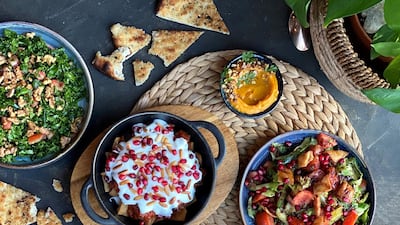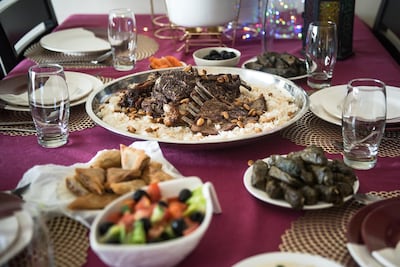"This feels more like a dinner than breakfast," a friend mutters when arriving at a plush Abu Dhabi hotel for iftar.
In a way, he is right.
We are ushered to our seats and once we eat our dates, the soups, salads and main meals arrive to our table in short order.
This is iftar in the pandemic age and I am digging it.
My friend, however, ruefully observes the vibe of the room. He thinks it’s quiet, I argue it's serene.
He points to the lack of anticipatory buzz leading up to iftar, while I highlight the newfound civility amid the patrons.
The thrill of the buffet
So we are not on the same plate, so to speak. But one thing we agree on is how a lack of buffet station is a game-changer for iftars.
With health and safety measures curtailing the capacity of diners, a number of UAE hotels have ditched the buffet, long a staple of iftars, for the kind of elegant a la carte offerings reserved for the evening suhoor service.
An unintended benefit of this has been in the changing psychology of many seasoned iftar diners.
One of them being me.
Pre-pandemic, I considered myself an expert on all things “buffet-ology”.
I even wrote a piece for The National elucidating on the "golden rules" of buffet eating, the most important of which was to respect the process. "This means arriving to the hotel a few minutes before show-time and do a reconnaissance of the meal," I pronounced with relish.
This is the lost buzz my friend is referring to. It is the excitement of warriors pacing the arena and pondering a plan of attack (a killer tip: avoid unnecessary fillers such as bread and salads, and head straight for the meat).
Now that’s gone and the only anticipation we can summon pre-meal is when a menu offers something more creative than a mixed-grill plate.
Then comes the guilt
But it’s a thrill worth sacrificing, for what is gained is a more soulful experience.
For starters, we have more immersive exchanges at the iftar table, which was a rarity in the live cooking stations era.
When the buffet was in full swing, I would often have one eye on my companions and the other on the worryingly diminishing number of lamb chops on the grill.
Conversations were unfocused at best. Spirited debates would be jarringly paused as I decided to go “for another round” of the culinary gauntlet.
Eventually, I would lose my appetite from eating too much and too soon.
I'd also start to feel increasingly guilty when surveying a growing pile of carelessly uneaten plates strewn around the dining hall.
Then came the worst part: going to the nightly taraweeh prayer and feeling out of sorts because I overate, again.
A la carte is so much better
This Ramadan, I have felt none of those physical pangs and anxieties.
With the buffet out of the equation and food portions controlled by the set menu, iftars have been truly enriching.
The constant clatter of plates and shuffling feet have been replaced with the warm hum of conversation.
Iftar services are now also smooth and swift enough to have us ready to go to the mosque in time and feeling alert.
It all makes me feel grateful for being able to see another Ramadan, surrounded by friends, in one of the safest countries in the world.
Therefore, I plan to permanently retire from iftar buffets, even when they do make a resurgence.
It has been a great ride, but I've now found a way to enjoy iftar with my heart and stomach full, but not to bursting.
Scroll through the gallery below to see some of the best Ramadan decorations around the UAE:




























